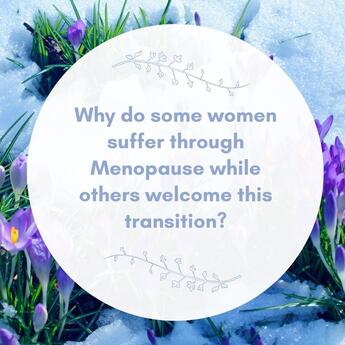 Menopause, for some women, is a welcome transition to the post-reproductive phase of one’s life. However, it has gotten a bad rap due to the symptoms many women experience while their bodies adjust to the changes. From a Chinese Medicine perspective, it is the inability of the body to adjust it’s energies gracefully to this new phase that causes symptoms, not the menopause itself. A gradual transition over time in a healthy individual will be less likely to induce the struggles commonly associated with menopause such as hot flashes, weight gain, dryness, sleep problems and mood swings. (Irregular periods, while inconvenient, are not necessarily considered a problem in this view, but par for the course of change leading up to true menopause). Menopause is medically defined as the absence of a period for 1 year. Up until that point, the changes are considered peri-menopause: a slowing down of the reproductive faculties of the body. The struggles mentioned above can begin during peri-menopause, as early as a women’s 40’s and can last into her late 50s. During this time, the ovaries start making less estrogen and progesterone (the hormones that regulate menstruation). These hormonal changes are the reason for the hot flashes that tend to be the main complaint of women approaching menopause. The hot flashes in turn can disrupt sleep, leading to further imbalances and mood swings. The hormones also affect the metabolism, which can lead to weight gain and body changes. Vaginal dryness is also related to the declining hormones. In simplistic terms, these hormonal changes can be seen in TCM as a decline in yin, leading to a yin-yang imbalance. Yin refers to the cooling, calming, moisturizing influences of the body, and when deficient can lead to heat, dryness and nervousness or irritability. Acupuncture (and TCM lifestyle guidance) can help to re-calibrate the yin-yang balance to ease this transition. A year-long NCCIH-funded study involved 209 peri-menopausal & menopausal women age 45–60 who had at least four hot flashes per day. Researchers found that acupuncture significantly reduced symptoms of hot flashes, anxiety, sleep issues and memory loss by as much as 36.7 %. The improvements persisted at least 6 months after treatment. Another study compared menopausal symptoms of 70 women, after half of them had 6 weeks of regular acupuncture. In the acupuncture group there were clinically significant improvements in occurrence of hot flashes, night sweats, and other physical and emotional symptoms. And even for women who are abruptly pushed into menopause, such as after a hysterectomy or ovariectomy, whose symptoms tend to be more severe, acupuncture (along with ear-acupuncture!) has been shown to reduce their (generally more intense) hot flashes as well. Hormone Replacement Therapy (HRT) is the western medical approach to menopause for severe symptoms brought on by hormonal changes, but comes with serious risks and is not for everyone. Acupuncture has the power to rebalance the body’s energies when life transitions challenge our stability and is a great alternative or complementary therapy for any woman entering this new phase of life. The shift into menopause can be much smoother with a little assistance from your local acupuncturist, but don’t wait until symptoms are severe. Call today to bring more balance into your personal journey! |
AuthorsRebecca M H Kitzerow is a Licensed Acupuncturist practicing in La Center, Washington. With over a decade of experience she has won 10 Nattie consumer choice awards from Natural Awakenings Magazine since 2014. Archives
July 2024
Categories
All
|
Photos from Hey Paul Studios, BeGreen_Studio, Pawel Pacholec, 1950sUnlimited, toulupaliaqaz, Joelk75, OnTask, Robert Gourley, cnu_sports, Mitya Ku, wuestenigel (CC BY 2.0), FootMassagez, 401(K) 2013, Mariana Heinz, @EdwardTerry, fishhawk, liverpoolhls, torbakhopper, Boemski, dolomitibl, Driscolltheque, Dave n Laura, Vaping360, MVWorks, Life Mental Health, MVWorks, mikefats, Scot Nelson, jfl1066, wZa HK, ruurmo, Guadalupe Cervilla, Army Medicine, GViciano, torbakhopper, adrigu, Saulo Cruz, Ben Cumming, marniejoyce, kcxd, JasonCorey, kanenas.net, Live to Create Photography, gm.esthermax, Unique Hotels Group, Zenspa1, mysiana, Tobias Lindman, Leader Nancy Pelosi, Kristoffer Trolle, swanksalot, Bill Selak, Parker Knight, stimpsonjake, Gedankensprudler, SuperFantastic, tonynetone, marniejoyce, JeepersMedia, Illusive Photography, 'Ajnagraphy', Iban Torras, scotted400, gtall1, dvanzuijlekom, BPPrice, Skley, torbakhopper, Renato Ganoza, anka.albrecht, QUOI Media, Public Domain Photos, Instant Vantage, Victor Tongdee, Free Grunge Textures - www.freestock.ca, sportEX journals, Nadja Tatar, angela n., marniejoyce, MVWorks, Karolina Kabat, Thomas Fisher Rare Book Library, UofT, ginnerobot, tracilawson, haven't the slightest, My Photo Journeys, Pierre Willemin, Florena_Presse, SuperFantastic, colindunn, zzkt, TraumaAndDissociation, ER24 EMS (Pty) Ltd., shixart1985 (CC BY 2.0), marniejoyce, Tomás Fano, freestock.ca ♡ dare to share beauty, Archives New Zealand, Jaykhuang, airdrie.m, Go-tea 郭天, OnTask, wuestenigel, focusonmore.com, Disney | ABC Television Group, Andrew Gustar, Didriks, ConstructionDealMkting, charlywkarl, barnimages.com, Lel4nd, runwaypilates, michaelstephanfotografie, McLevn, TraumaAndDissociation, eLife - the journal, Lars Plougmann, wuestenigel, shixart1985, boviate, davis.steve32, kevin dooley, @the.photoguy (insta), frederic.gombert, Feathering the Nest, Victor Tondee, shixart1985, wuestenigel, Joe K Gage, kennethkonica
 RSS Feed
RSS Feed
